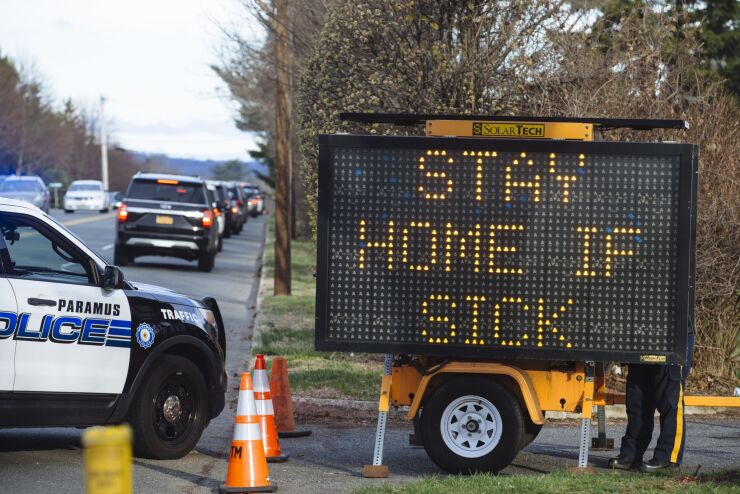Right now, in the midst of the COVID-19 crisis, it is tough to imagine the fertile environment for insurtech start-ups that the sector has enjoyed can last much longer. The crunch from social distancing, if not out-and-out restrictions on economic activity, will undeniably freeze the flow of cash to untested ideas. This means that the tenor of the insurance industry over the past three years is about to shift considerably.
The combination of light-speed mass media, global commerce, and population growth make this unlikely to be the last such panic to sweep the globe. Consumers are watching their governments dither on how to support working people and big industries in this time of catastrophic disruption.

Catastrophe response is the insurance industry's stated goal. And this is far from the only kind of potential wage loss workers can face. With unprecedented attention being paid to not just the generally comfortable middle- to upper-class, but also the plight of hourly, part-time, or unemployed workers, insurers can act.
Currently, the private insurance sector has few answers for these workers and their employers. Business-interruption insurance explicitly excludes losses related to virus or bacterium, thanks to language inserted in ISO forms after SARS; while it is arguable that the virus is not the cause of the losses, enforced closings are, the sentiment is clear.
Supplemental insurance products like Aflac’s have existed for some time, but focus on wage loss from personal illnesses or catastrophic accidents. COVID-19 illustrates that a person doesn’t have to be sickened to be affected by a major illness, nor that they must be laid up in a hospital bed to stop earning. Women and men who wait tables, tend bar, drive to the airport and more were given the choice -- before widespread closures and shutdowns went into effect -- to either willingly propagate a pandemic or risk short-term financial ruin.
Other industry sectors are encountering similar issues. “Once the WHO has declared coronavirus a pandemic, travel insurance companies were telling their customers, ‘Have you ever read the fine print?’” says Dirk Schmidt-Gallas of Simon-Kucher & Partners. “This has been ruining the reputation of insurance globally and we have to stop that.”
It’s unlikely that Schmidt-Gallas’ warning will be heeded, however. A proposed bill in New Jersey to force insurers to make business-interruption payouts, despite current contract language, has been forcefully opposed by the industry. Not that there isn’t enough fault to go around: No states have approved an ISO rider that would’ve made the coverage available.
In essence, the risk to insurers is multi-fold: A massive hit to the reputation of the industry, the potential for governments to force payments companies weren’t prepared for, and of course, the loss of a huge swath of the customer base due to closings and perceived uselessness of the product.
“Insurance is a subscription business. People canceling subscriptions would hurt insurers massively,” Schmidt-Gallas warns. Also, if world governments step in to solve customers’ issues, the industry as a whole could be disintermediated.
Insurers are playing by the playbook they developed during the SARS outbreak. But that event precedes the insurtech wave, and its laser-focus on fixing the industry for new customer expectations. When the insurtech Hippo, a home insurance provider that’s one of the industry’s few unicorns, launched, it made a point of discussing how not only are insurance sales practices outdated, but the insurance policies themselves are. Named goods like pewter and China aren’t in the typical household anymore, and so the company ensured that items such as electronics and outdoor equipment replaced them. Alex Timm, the founder of another unicorn, the auto insurer Root, struck out on his own partially due to his belief that insurance pricing is “extremely broken.”
While retreat is likely to be the dominant strategy across insurance for the foreseeable future, the industry should be thinking about its plan for the post-Coronavirus world: a societal change likely only equal to 9/11 or the fall of the Berlin Wall and probably even greater than the 2008 financial meltdown.
Today, insurers’ toolkits include new customer interaction and data points that didn’t exist during previous world crises. Parametric insurance, for example, that triggered and paid out some “walking around money” during pandemic or similar crises would go a long way toward alleviating some of the pain that people feel now.
It’s the model that Kate Stillwell and her company, Jumpstart, have operated on. As an earthquake expert, Stillwell was concerned that most people were never fully financially prepared for a quake. Sure, home insurance pays out for structures, but “people have ancillary or indirect expenses not related to the physical losses,” she notes. “Earthquake models are good at physical damage and the cost of physical breakage, but the true costs end up being twice what you anticipated.”
Jumpstart pays a fixed amount to policyholders when a quake is detected in their area, no questions asked, using USGS data and more. Could such a model work when certain societal conditions are met -- say, enforced closure of schools and businesses?
“I have no idea how to make it actuarially viable,” Stillwell says, noting her expertise is in earthquake losses, “but the model works. We've never tried to make people whole, we've always said, ‘you just need some sort of bridge in order to start meeting unexpected expenses.’”
Insurers’ response during and after the COVID-19 crisis will shape the industry for the next 20 years. That it is happening at the same time of the massive digital shift in the industry should only help the industry deliver better on its promise.





